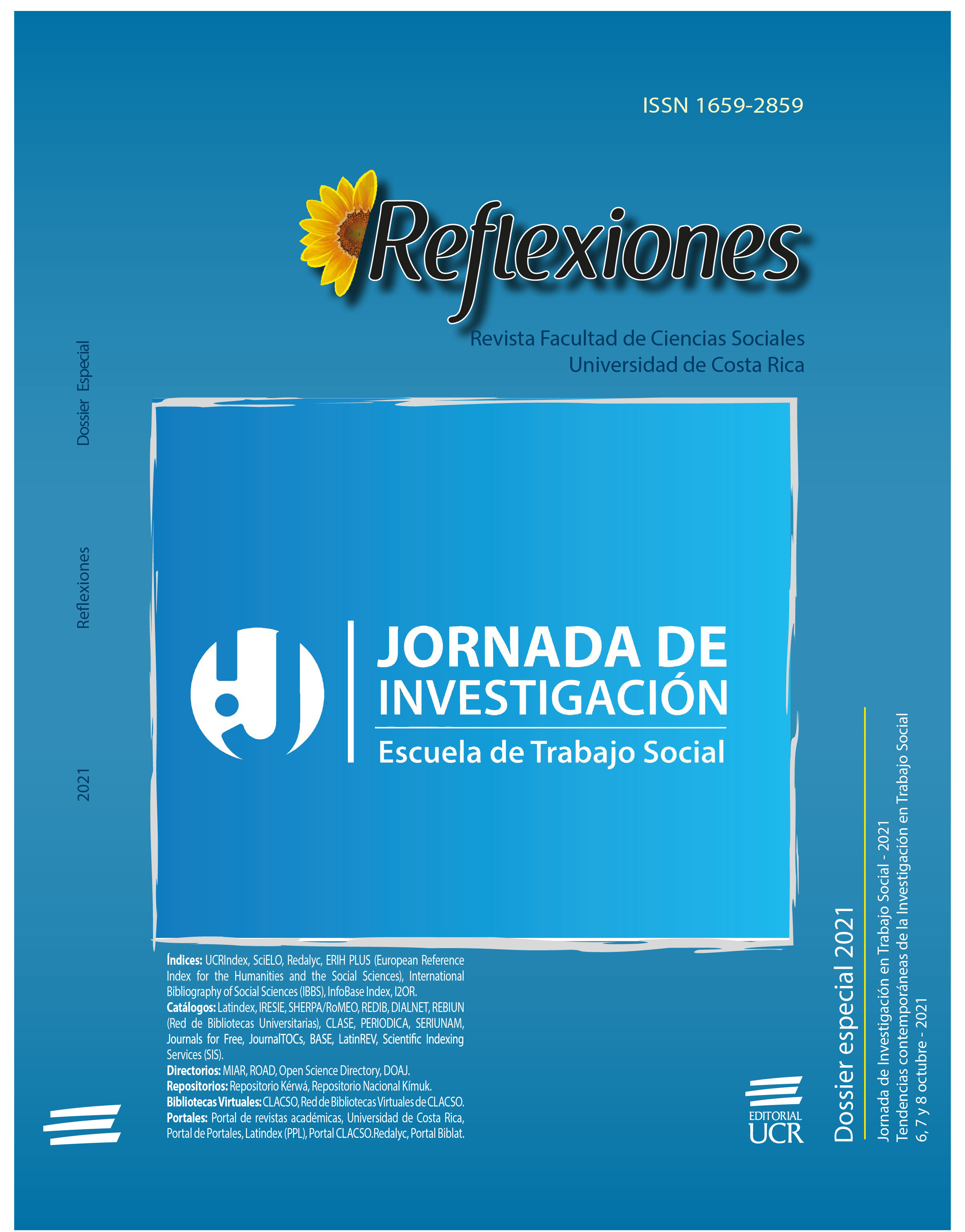Abstract
Introduction: talking about digital social work in Mexico places in debate the use of information and communication technologies as methodological tools in the processes of school practice, from a face-to-face scenario to a digital one; a challenge for the faculty in training students in the discipline of social work.
Objective: to examine the methodological strategies of research / digital intervention from social work in vocational training, with the intention of specifying how these technologies have been incorporated into the educational field in a context of syndemic.
Method and technique: an exploratory, cross-sectional and qualitative study was carried out using the virtual ethnographic method. A focus group made up of four school practice teachers was carried out through Zoom, developed at the National School of Social Work. The analysis was carried out using an inductive, descriptive and interpretive approach.
Results: the teachers carried out intervention processes from digital social work, with the design of digital strategies, which achieved a methodological restructuring in their school practices, and an exposition of the implications and challenges faced.
Conclusions: the syndicate caused by COVID-19 accelerated the use of information and communication technologies, but this is not presented in an equitable way, since there is a digital divide in the use of information and communication technologies in students and teachers of this study.
References
Caravaca Llamas, Carmen. 2014. «Trabajo social on-line. El futuro de la intervención social». Pensamiento al margen, 1: 1-17. http://hdl.handle.net/10201/51373.
CONAMED (Comisión Nacional de Arbitraje Médico). 2016. «Consentimiento Válidamente Informado», acceso el 24 de octubre de 2021, http://www.conamed.gob.mx/gobmx/libros/pdf/libro_cvi2aEd.pdf
Comisión Nacional de los Derechos Humanos. Instituto Nacional de Estudios Históricos de las Revoluciones de México. SEP. 2017. «Derecho de acceso y uso de las tecnologías de la información y la comunicación», acceso el 24 de octubre de 2021, http://appweb.cndh.org.mx/biblioteca/archivos/pdfs/foll_DerAccesoUsoTIC.pdf.
Domínguez González, Nancy, y Serna Poot, Daniel. 2021. «Competencias docentes para la investigación en línea». Revista Iberoamericana para la Investigación y el Desarrollo Educativo, 12 (enero-junio) http://www.scielo.org.mx/scielo.php?script=sci_pdf&pid=S2007-74672021000100183&lng=es&tlng=es&nrm=iso.
Declaración Universal sobre Bioética y Derechos Humanos de la Organización de Naciones Unidas. 2005, acceso el 23 de octubre de 2021, http://www.conbioetica-mexico.salud.gob.mx/descargas/pdf/subtemas/bioeticayderechoshumanos.pdf.
Dirección de Innovación y Desarrollo Tecnológico de la UNAM, (DIyDT-UNAM), acceso el 20 de octubre de 2021, https://www.tic.unam.mx/direccion-de-innovacion-y-desarrollo-tecnologico-de-la-dgtic-tiene-nueva-titular/
Foucault Michel. 1994. Hermenéutica del sujeto. Traducido por: Alvarez-Uria. Madrid: La Piqueta.
Garzón, Cecilia. 2021 «Las competencias docentes en el siglo XXI de cara a la virtualidad de la educación con ocasión del COVID-19». Revista Boletín Redipe 10 (mayo): 177-188. https://doi.org/10.36260/rbr.v10i5.1295
Gallego, Arrufat, Vanessa Gámiz y Elba Gutiérrez. 2010 «El futuro docente ante las competencias en el uso de las tecnologías de la información y comunicación para enseñar». Edutec. Revista Electrónica De Tecnología Educativa, 34: 1-18. https://doi.org/10.21556/edutec.2010.34.418
Hall T., Robert. 2017. Ética de la investigación social, México. México: CONBIOÉTICA, Universidad Autónoma de Querétaro. Edición en PDF.
Hine, Christine. 2000. Etnografía virtual. Barcelona: Editorial UOC
López Alonso, Ma. Concepción, Darlene González Miy, y Araceli Mejía Duclaud. 2014. «La asertividad: una competencia primordial del docente en línea». Revista mexicana: Experiencias de Bachillerato a distancia 6 (12): 33-38.http://revistas.unam.mx/index.php/rmbd/article/view/64863
López Peláez, Antonio. 2015. Teoría del Trabajo Social con Grupos. Madrid: Universitas
López Peláez, Antonio, y Chaime Marcuello Servós. 2018. «El Trabajo Social en la Sociedad Digital. Nuevas Tecnologías en la Intervención Profesional». Servicios Sociales y Política Social, 35 (116): 25-34. https://www.serviciossocialesypoliticasocial.com/-34
Morales Arce, Víctor Gerardo. 2013. «Desarrollo de competencias digitales docentes en la educación básica». Revista Apertura. 5 (1) http://www.udgvirtual.udg.mx/apertura/index.php/apertura/article/view/367/307%23resu
Pink, Sarah, Heather Horst, John Postill, Larissa Hjorth, Tania Lewis y, Jo Tacchi. 2016. Etnografía digital, principios y práctica. España: Morata.
National Association of Social Workers (NASW) y Association of Social Work Boards (ASWB). 2005. «Standards for technology and Social Work practice», accesso el 12 de octubre de 202. https://www.labswe.org/assets/Docs/NASW_ASWB_Stds_for_Tech_and_SW_Practice.pdf
Negrín Hernández, Adriana. 2020. «Trabajo Social y tecnología digital: un análisis bibliométrico». Tesis de pregrado, Universidad de la Laguna. http://riull.ull.es/xmlui/handle/915/19344
Thorne Sally, Sheryl Reimer Kirkham, y Katherine Flynn-Magee. 2004. «The analytic challenge in interpretive description». International Journal of Qualitative Methods, 3(1):1-21. https://doi.org/10.1177/160940690400300101


